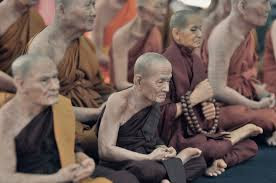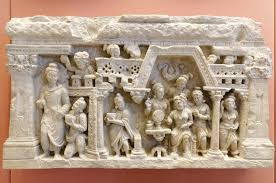Response of conversion - No one has never a scheme of response of conversion religion been put forth which had nothing to do with revelation and whose commands are born of the examination of the social needs of man and which are not the orders of a God !
Link here -
What is ancient wisdom learning keys?
Conversion Treatment
(Highly and Holy Rich Family Conversion)
Conversion Yasha
How could he escape from this orgy? Was there any better way of life than the way he was leading? Not knowing what to do, he decided to leave his father's house.
One night he left his father's house and was wandering about, He happened to wend his way towards Isipathana.
One night he left his father's house and was wandering about, He happened to wend his way towards Isipathana.
The Blessed one who was staying at Isipathana, having arisen at dawn, was walking up and down in the open air. And the Blessed one saw Yashas, the noble youth coming from after giving utterance to his feelings.
And the Blessed One having heard his cry of distress, said: There is no distress ,there is no danger. Come , I will show you the way, " and the Blessed Lord preached his gospel to Yashas.
And Yashas, when he heard it, became glad and joyful, and he put off his gilt slippers , and went and sat down near the Blessed One and respectedly saluted him.
And Yashas, when he heard it, became glad and joyful, and he put off his gilt slippers , and went and sat down near the Blessed One and respectedly saluted him.
Yashas hearing the Buddha's word's, requested the Blessed One to take him as his disciple. Then he bade him come and asked him to be a Bhikku to which Yashas agreed.
(Conversion Of The Kassyapas Family)
There lived in Benaras a family known as the Kassyapa family. There were three sons in the family.
They were very highly educated and carried on a rigorous religious life. The three brothers were known as Uruvella Kassyapa, Nadi Kassyapa, and Gaya Kassyapa.
Of Uruvella Kassyapa had a following of five hundred Jatilas, Nadi Kassyapa had three hundred Jatilas as his disciples and Gaya Kassyapa had two hundred Jatilas. Of these the chief was Uruvella Kassyapa.
One day the Blessed One thought himself taking the initiative and asked Kassyapa, "Are you an Arhant? If you are not an Arhant what good is this Agnihotra going to do to you?
Of Uruvella Kassyapa had a following of five hundred Jatilas, Nadi Kassyapa had three hundred Jatilas as his disciples and Gaya Kassyapa had two hundred Jatilas. Of these the chief was Uruvella Kassyapa.
One day the Blessed One thought himself taking the initiative and asked Kassyapa, "Are you an Arhant? If you are not an Arhant what good is this Agnihotra going to do to you?
Kassyapa said ," I don't know what is to be an Arhant? Will you explain it to me?
The Lord then told Kassyapa, " An Arhant is one who has conquered all the passions which disturb a man from pursuing the eight ford Path.
The Lord then told Kassyapa, " An Arhant is one who has conquered all the passions which disturb a man from pursuing the eight ford Path.
Agnihotra cannot cleanse a man of his sins. Kassyapa was a proud person. But he did feel the force of the Blessed Lord's argument. Making his mind pliant and yielding, until at length prepared to be a vehicle of the true law, he confessed that his poor wisdom could not compare with the wisdom of the world honoured One.
And so, convinced at last, humbly submitting Uruvella Kassyapa accepted the doctrine of the Lord and became his followers.
And so, convinced at last, humbly submitting Uruvella Kassyapa accepted the doctrine of the Lord and became his followers.
Following their master, the followers of Kassyapa, virtuously submissive, in turn received the teaching of the law. Kassyapa and all his followers were thus entirely converted.
Link here -
Conversion Reaction
( Rajagraha People Sariputta, Moggallana's Conversion)
While the Blessed Lord was in Rajagraha there resided a well known person by name Sanjay with a great retinue of Parivrajakas numbering about two hundred and fifty as his disciples.
Among his disciples were Sariputta and Moggallana two young Brahmins. Sariputta and Moggallana were not satisfied with the teachings of Sanjaya and were in search of something better.

Sariputta and Moggallana, through not brothers, were bound together as though they were brothers. They had given their word to each other.

Sariputta and Moggallana, through not brothers, were bound together as though they were brothers. They had given their word to each other.
He two first attains the truth shall tell the same to the other one. That was their mutual engagement. Accordingly Sariputta went to the place where Moggallana was. Seeing him, he said to Sariputta : Your countenance, friend , is serene, your complexion is pure and bright.
Have you then really reached the truth? Yes, friend, I have come to know the truth. " "And how, friend, have you done so? Then Sariputta told him what happened between him and Assaji.
Then Moggallana said to Sariputta, " Let us go, friend, and join the Blessed One, that he, the Blessed One, may be our teacher ."
Then Sariputta and Moggallana took with them two hundred and fifty wandering ascetic and went to the Veluvana in Rajagraha where the Blessed One was staying.
And the Blessed One saw them -Sariputta and Moggallana, coming from afar:on seeing them he thus addressed the monks: There, monks arrive two companions, "pointing towards Sariputta and Moggallana, " these will be my chief pair of disciples, and auspicious pair.
When they had arrived at the bamboo grove, they went to the place where the Blessed One was, having approached him, they prostrated themselves, with the heads at the feet of the Blessed One, and said to the Blessed One :Lord, let us receive ordination from the Blessed One.
When they had arrived at the bamboo grove, they went to the place where the Blessed One was, having approached him, they prostrated themselves, with the heads at the feet of the Blessed One, and said to the Blessed One :Lord, let us receive ordination from the Blessed One.
The Blessed One then uttered the usual formula indicating admission, "Ehi Bhikku " (Come Monks) and Sariputta and Moggallana and the two hundred Jatilas became the disciples of the Buddha. "
( King Of Magadha Bimbisara's Conversion)
Rajagraha was the capital of Seniya Bimbisara, King of Magadha. Having heard of the conversions of this large number of Jatiles, everyone in the city had begun to talk about the Blessed One.
In former days, Lord, to me when I was a prince, came this thiyght: O that I might be inaugurated king! That was my first aspiration, Lord, that is now fulfilled. '
And might then a holy one, a fully Enlightened One, come over into my kingdom! This was my second aspiration, Lord, that is now fulfilled. And might I minister to that Blessed One!
That was my third aspiration, Lord, that is now fulfilled. And might he, the Blessed One, preach the Dhamma to me! This was my fourth aspirations, Lord, and that is now fulfilled.
And might I understand the Dhamma of that Blessed One! This was my fifth aspiration, Lord, this is now fulfilled. These were my five aspirations, Lord, which I entertained in former days when I was a prince.
Wonderful Lord! Wonderful just as if one should step up, what had been overturned ,or should reveal what had been hidden, or should point out the way to one who had lost his way ,or should bring a lamp into the darkness, in order that those who had eyes might see things, thus has the Blessed One preached the Dhamma in many ways.
Wonderful Lord! Wonderful just as if one should step up, what had been overturned ,or should reveal what had been hidden, or should point out the way to one who had lost his way ,or should bring a lamp into the darkness, in order that those who had eyes might see things, thus has the Blessed One preached the Dhamma in many ways.
I take refuge, Lord, in that Blessed One, and in the Dhamma, and in the fraternity of Bhikkus (monks) .May the Blessed One receive me from this day forth, while my life lasts, as a lay disciple who has taken refuge in him.
(A Courtesan Of Rajagraha)
Jeevaka was a son of Salvati, a courtesan of Rajagraha. Immediately after birth the child, being illegitimate, was placed in a basket and thrown on a dust - heap.
A large number of people were standing by the dust - heap watching the child. Abhaya, the Rajakumara, happened to pass by the site. He questioned the people who said : It is alive. "
For this reason the child was called Jeevaka. Abhaya adopted him and brought him up. When Jeevaka grew in age he learned how he was saved and was charged with the intense desire to qualify himself to save others.
For this reason the child was called Jeevaka. Abhaya adopted him and brought him up. When Jeevaka grew in age he learned how he was saved and was charged with the intense desire to qualify himself to save others.
He therefore went to the University of Takashila without the knowledge and permission of Abhaya and studied medicine for seven years. Returning to Rajagraha he set up his practice as a doctor and within a very short time acquired a great name and fame in the profession.
Jeevaka was appointment physician to the king and Jung's women. But Jeevaka was greatly attracted to the Blessed Lord.
Jeevaka was appointment physician to the king and Jung's women. But Jeevaka was greatly attracted to the Blessed Lord.
Consequently he also acted as a physician to him and the Sangh. He became a disciple of the Lord. The Blessed Lord did not make him a Bhikku as he wanted him to remain free to tend to the sick and the wounded.
Link here -
Conversion Causes
(Conversion Of Brahmins)
At the back of the Gridhrakutta mountains, near Rajagraha, there was a village, of some seventy or so families, all of them Brahmins.
The Buddha wishing to convert these people, came to the place and sat down under a tree. The people seeing the dignity of his presence, and the glorious appearance of his body, flocked round him, on which he asked the Brahmins how long they had dwelt in the mountain there, and what their occupation was.
To this they replied :We have dwelt here during thirty generations past, and our occupation is to tend cattle. " If one of us dies, we assemble and pray that he may be born in the heaven of Brahma, and so escape further transmigrations."
To this they replied :We have dwelt here during thirty generations past, and our occupation is to tend cattle. " If one of us dies, we assemble and pray that he may be born in the heaven of Brahma, and so escape further transmigrations."
The Buddha replied :This is not a safe way, not by it can you benefit. The true ways is to follow me, become true ascetic, and practise complete self-esteem composure with a view to obtain Nirvana, "and then he added these lines.
They who consider truth as that which is untrue, and regard that which is untrue as truth, this is but to adopt heretical opinions, and can never lead to true advantage.

But to know as truth that which is true, and to regard as false that which is false, this is perfect rectitude, and this shall bring true profit. Everywhere in the world there is death - there is no escape from it.

But to know as truth that which is true, and to regard as false that which is false, this is perfect rectitude, and this shall bring true profit. Everywhere in the world there is death - there is no escape from it.
To consider this as the condition of all states if being that there is nothing born but must die, and therefore, to desire to escape birth and death, this is to exercise one's self in Religious Truth.'
(Conversion Of Lowly Barber, Upali)
While going back Upali, the Barber thought : The Sakyans are a fierce people. If I go back with these ornaments they will kill me thinking that I have killed my companions and run away with their ornaments.
Why should I not go the way these young men of the Sakya clan have gone.? " Why indeed should I not?" asked Upali to himself. And he led down the bundle of ornaments from his back, and hung it on a tree, saying :"Let him who finds it take it as a gift," and returned to follow the Sakya youths.
And the Sakyans saw him coming from afar, and on seeing, they said to him : What have you come back for, good Upali? "
And the Sakyans saw him coming from afar, and on seeing, they said to him : What have you come back for, good Upali? "
Then he told them what he felt and they replied : Thou has done well, good Upali, in that thou didst not return, for the Sakyans are fierce, and they might have killed thee. "
And they took Upali the Barber with them to the place where the Blessed One was. And on arriving there, they bowed down before the Blessed One and took their seats on one side.
And so seated they said to the Blessed One : We Sakyans, Lord, are haughty. And this Upali, the barber, has long been an attach, Lord, upon us.
May the Blessed One admit him to the Order before us, so that we may render him respect and reverence, and bow down with outstretched hands before him as our senior and thus shall the Sakyans pride be humbled in us!
Link here -
Conversion Examples
(Conversion Of The Sweeper, Sunita)
There lived in Rajagraha a scavenger by name Sunita. He earned his living as a road sweepper, sweeping away the rubbish thrown by the householders on the roadside.
His was a low and hereditary occupation. One day in the early hours of the dawn the Blessed One rose, dressed himself and walked into Rajagraha for alms followed by a large number of Bhikkus.
Now Sunita was cleaning the street, collecting scraps, rubbish, and so on into heaps and felling therewith the basket which he carried in a yoke.
Now Sunita was cleaning the street, collecting scraps, rubbish, and so on into heaps and felling therewith the basket which he carried in a yoke.
And when he saw the Master and his train approaching, his heart was filled with joy and awe.
Finding no place to hide in on the road, he placed his yoke in a bend in the wall and stood as if stuck to the wall, saluting the Lord with clasped hands.
Finding no place to hide in on the road, he placed his yoke in a bend in the wall and stood as if stuck to the wall, saluting the Lord with clasped hands.
Then the Lord when he had come near, spoke to him in voice divinely sweet, saying :Sunita! What to you is this wretched mode of living? Can you endure to leave home and come into the order? "
And Sunita, experiencing the rapture of one who has been sprinkled with Ambrosia ,said : "If even such as the Exalted One may in this life take Orders, why should I not? May the Exalted One suffer me to come forth. "
And Sunita, experiencing the rapture of one who has been sprinkled with Ambrosia ,said : "If even such as the Exalted One may in this life take Orders, why should I not? May the Exalted One suffer me to come forth. "
Then the Master said : "Come Bhikku!" And Sunita by the word received sanction and ordination and was invested with bowl and robes.
(The Untouchable Sopaka And Suppiya's Conversion)
Sopaka was a pariah of Shravasti. In her travail at his birth his mother fell into a long deep swoon, so that her husband and kinsfolk said "She is dead! "
Sopaka was a pariah of Shravasti. In her travail at his birth his mother fell into a long deep swoon, so that her husband and kinsfolk said "She is dead! "
And they bore her to the cemetery and prepared to cremate her body. But on account of the storm of wind and rain the fire would not burn. So they went away leaving sopaka's mother on the funeral pyre.
Sopaka's mother was not then dead. She died afterwards. Before her death she gave a birth to a child.
Sopaka's mother was not then dead. She died afterwards. Before her death she gave a birth to a child.
The child was adopted by the watchman of the cemetery and was brought up by him along with his own child Suppiya . The child was known by the name of the community Sopaka to which its mother belonged.
The Blessed Lord One day happened to pass by the cemetery. Sopaka seeing the Lord, approached him. After saluting the Lord he asked his permission to join him as his disciple.
The Blessed Lord One day happened to pass by the cemetery. Sopaka seeing the Lord, approached him. After saluting the Lord he asked his permission to join him as his disciple.
Sopaka was then only seven years old. So the Lord asked him to obtain his father's consent. Sopaka went and fetched his father. The father saluted the Lord and requested himy to admit his son to the Ordefr.
Notwithstanding that he belonged to the pariah community the Lord admitted him to the Order and instructed him in the doctrine and discipline.
(Conversion Of Sakya Women)
When the Blessed One had been on a visit to his father's home the desire to join the Sangha was as keen among the Sakya women as it was among the Sakya men.

Well, Ananda, I grant if Mahaprajapati insists that women must be allowed to take Parivraja under the doctrine and discuss proclaimed by me.
But it shall be subject to eight conditions. Let Mahaprajapati Gotami take upon herself the responsibility of enforcing the Eight Chief Rules .That will be her initiation. "
Just, Ananda, as a man or a woman, when young and of tender years, accustomed to adorn himself, would, when he had bathed his head, receive with both hands a garland of lotus flowers, or of jasmine flowers or of stimutaka flowers ,and placed it on the top of his head, even so do I, Ananda, take upon me these Eight Chief Rules ,never to be transgressed during my lifelong, " said Mahaprajapati to Ananda.
Then the Venerable Ananda returned to the Blessed One, and bowed down before him, and took his seat, on one side.
Just, Ananda, as a man or a woman, when young and of tender years, accustomed to adorn himself, would, when he had bathed his head, receive with both hands a garland of lotus flowers, or of jasmine flowers or of stimutaka flowers ,and placed it on the top of his head, even so do I, Ananda, take upon me these Eight Chief Rules ,never to be transgressed during my lifelong, " said Mahaprajapati to Ananda.
Then the Venerable Ananda returned to the Blessed One, and bowed down before him, and took his seat, on one side.
And, so sitting, the Venerable Ananda said to the Blessed One :Mahaprajapati Gotami, Lord, has taken upon herself the responsibility for the enforcement of the Eight Chief Rules, she may therefore be regarded as having received the Upasampada initiation ,"(entry to Sangha)
There was, in the realm of Pasenadi, king of Kosala, a robber named Angulimala, a ruffian whose hands were red with blood, who was always killing and wounding ,and showed no mercy to any living creatures.
There was, in the realm of Pasenadi, king of Kosala, a robber named Angulimala, a ruffian whose hands were red with blood, who was always killing and wounding ,and showed no mercy to any living creatures.
Because of him, what had villages were villages no more, what had been township were townships no more, and what had been countryside was countryside no more.
From every human being whom he slew, he took a finger to make for himself a necklace, and so got his name of " Angulimala ".
When the two met the Lord said : " I have stopped, Angulimala, for your sake .Will you stop following your career of an evil doer?
When the two met the Lord said : " I have stopped, Angulimala, for your sake .Will you stop following your career of an evil doer?
I have been pursuing you in order to win you over, to cover you to the path of righteousness. The good in you is not yet dead. If you will only give it a chance it will transform you.
Angulimala felt overcome by the words of the Blessed One, saying, " At last this sage has tracked me down.
And now that thy hallowed words ask me to renounce evil deeds forever, I am prepared to give myself a trial, " replied Angulimala.
And now that thy hallowed words ask me to renounce evil deeds forever, I am prepared to give myself a trial, " replied Angulimala.
Angulimala threw into a deep abyss the string of his victims ' fingers which he wore round his neck and fell at the Master's feet and craved admission to the Brotherhood.
The Lord, the guide of gods and men, said :" Alsman, follow me", and Alsman since that summons Angulimala did become .
Conclusion -
In this way these are the best response in conversion in the best religion ( Dhamma) in world history. Which is more important thing to gain knowledge in the real living society.

